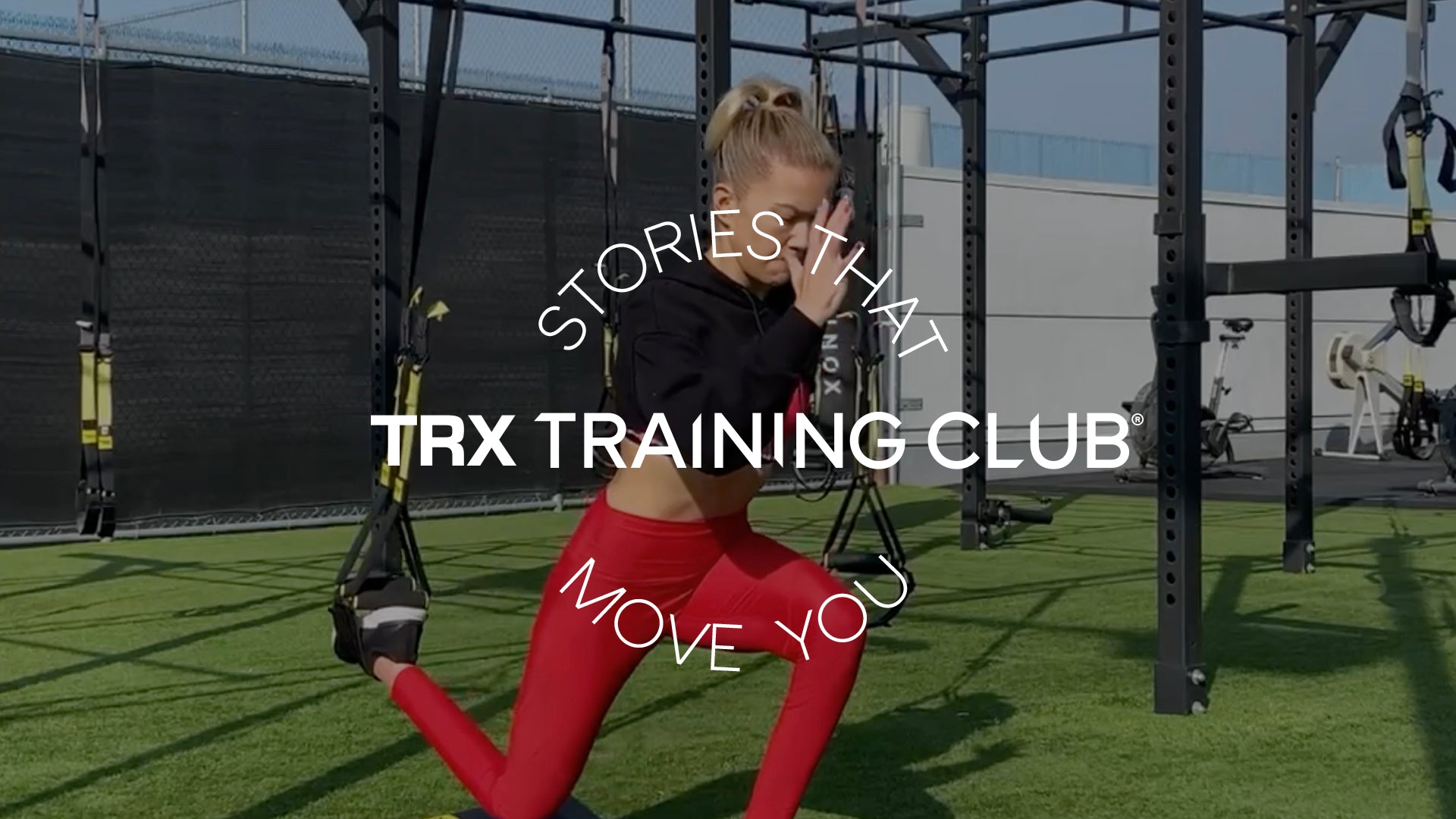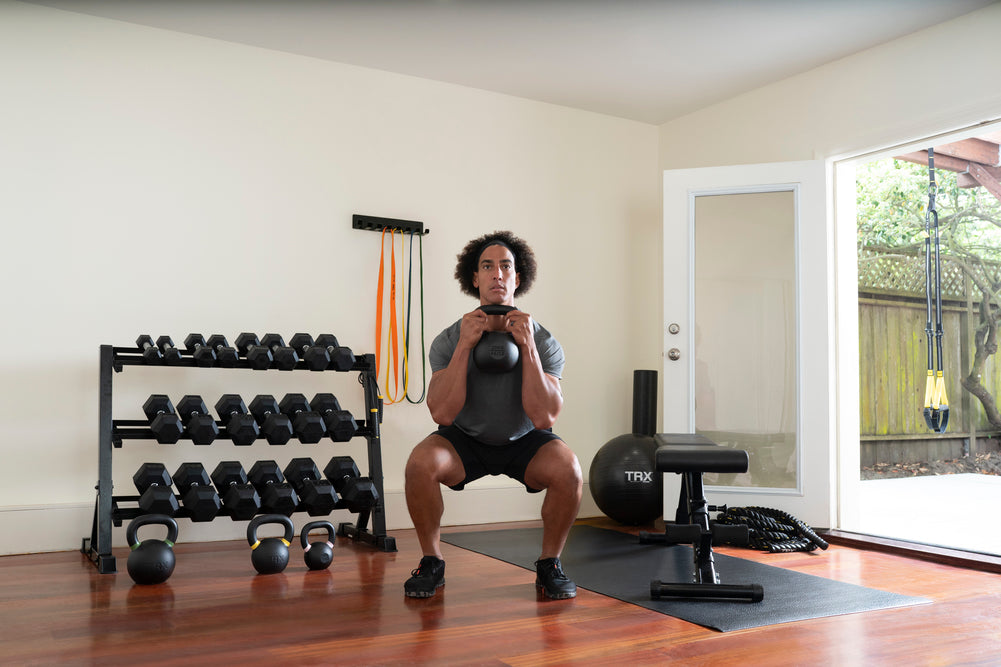“SHOW UP FOR OTHERS, ALWAYS.”
Straightforward and direct, TRX Trainer Marisa just goes for it all the time—with fitness, reading, everything. What inspires her? Knowing she can make a physical and emotional difference for the people she trains.
“Oh I’m a total nerd.” Marisa shakes her head, curls flying. She’s wearing a tie dye beanie that says M-A-T-H on the front, a fashion choice of self-awareness, her self-description literally at face value. She laughs a lot—a midsentence hiccup when she’s making fun of her own earnestness; a throaty chuckle when she’s proud of and/or flabbergasted by her own experiences, like when I ask her to list a random factoid about herself, and she scrunches her brows, admits, “I don’t know how to whistle.” But the ultimate Marisa laugh is an open-mouth-grinning, eyebrows-raised ha-haaa! that falls somewhere between a chortle and a squeal—it is a laugh to remember.

Before Marisa was a fitness trainer—and avid believer in the TRX Suspension Trainer–she was many chapters of many things. She grew up reading and with an interest in theater. Sports eluded her, thanks to an ongoing struggle with asthma. “I tried out for soccer senior year and it lasted a week…way too much running for me.” It’s ironic then, that she ended up where she did after high school—the Marine Corps.
“It was a huge slap in the face. Soccer was hard? Bootcamp was wild. Top three hardest things I've done in my life so far.”
Her grandmother raised her in L.A., happy to see her in school, happy to see her graduate high school with no pressure to be anything other than who she was. When Marissa got close to finishing bootcamp, her grandmother bought a plane ticket to see her graduate—she was currently undergoing rounds of chemotherapy from breast cancer and put her treatment on hold. “That was a huge motivating factor for me.” Marisa said. “I had to finish no matter what, no option of failing, to be there for her.”
There’s a theme that becomes immediately apparent when talking to Marisa. There’s a little curl in the corner of her lips, a light in her wide, brown eyes, when she talks about jumping into something new. “I kinda just dive into things,” she laughs, as she shares a wild story of looking for a job after college.
“Once I went on craigslist, answered an ad for marketing. Turns out it [the job] was standing outside of a gas station cleaning people’s tires and selling tire cleaner. I did that for 8 hours. Covered in grease. Hot, dehydrated. I got in my car, gave myself a pep talk… because I have to make money. I got out at the wrong exit, saw a gym that said NOW HIRING. I veered off, screeched into the parking lot, walked in… I’m dirty, grease stains everywhere, I walked up to this woman and said, ‘This is weird, I saw your sign, I've never worked in a gym, I'd love to interview.’ They hired me on the spot.” She’s amazed, recounting this memory. “It opened up so many doors for me.”
Her willingness to dive headfirst into everything and everything is part of what makes her so great at training others. When running a corporate wellness program she encountered a woman who lived in constant pain—years of surgeries, shoulder problems, and rehab programs hadn’t progressed her to a state where she was comfortable in the day to day. What did Marisa do? She dove in. She poured over anatomy books, rehabilitation literature, the latest research. She admits she’s borderline obsessive. Let’s figure this out. How do we get around this? Are the thoughts that run through her head.
It’s also why she values training with TRX, because it allows anyone to dive into fitness in a way that works for them. “I had an older client—she was on blood pressure meds, overweight, hadn’t exercised—and after training on the TRX together for months, she was off her meds. She hugged me, speechless, happy, crying, and it hit me—I’m not just making someone sweat… I’m saving a life. You really do have someone’s life in your hands. It’s the making-a-difference that keeps me coming back.”
Marisa’s own experience with rheumatoid arthritis have given her insight into the support that a TRX workout provides. Unlike other fitness methods, there’s an inherent adaptability to the straps that work around what your current abilities—or limitations—are. When Marisa gets a flare up, it causes joint pain, particularly in her fingers and hands. Grip strength becomes a challenge. Lifting weights feels out of scope. But, with the Suspension Trainer, she’s able to perform moves without relying on grip strength—she simply shoots her arms through the straps and with the right push & pull, performs moves she wouldn’t be able to otherwise. Not one to dwell on any labels, she jokes about how she has lupus, too, and is also allergic to vitamin C—she breaks out into a rash if she eats it. “I don’t know how i”m alive,” she laughs.
Owning her limitations motivates her to challenge clients to do the same. “I put other people first. When I’m teaching a class, I’ll say, ‘What’s stopping you? Who are you doing this for?’ I use that as leverage, to give them a job as motivation. People say to me ‘I don’t think I can do that,’ and somehow we end up doing it. I love proving to people they can do things they didn’t think they could do.”
Still, there are obstacles. Skilled beyond measure, it’s easy to see Marisa through the lens of a successful, utterly enchanting trainer. But, there’s no denying the obstacles any black woman faces, and Marisa knows this all too well.
“You get typecast into these roles. I would go into a place and I'm the only black teacher there, the only black person there. People would complain, she’s so aggressive, but then there’s another teacher who is a white woman who uses foul language and calls people names, who’s obviously overtly aggressive—but we’re not judged the same. I have to constantly walk in smiling and be overly kind, overly passive and it almost feels like I have to dim my character because if I walk in like a normal person, the reaction is What’s wrong with her? Oh she’s mean. You can’t approach her. It’s very exhausting. It’s hard.”
“A lot of times people are scared to talk about it—especially if they feel black people are going to be defensive. Like I'm going to be this angry black woman. It’s such a fallacy. We have to be open and talk and not feel shy or fearful. If we lead with love and be open and I-want-to-get-to-know-you, those conversations can develop.
:I wear my heart on my sleeve and, ultimately, I think that’s a great thing for the world.”



